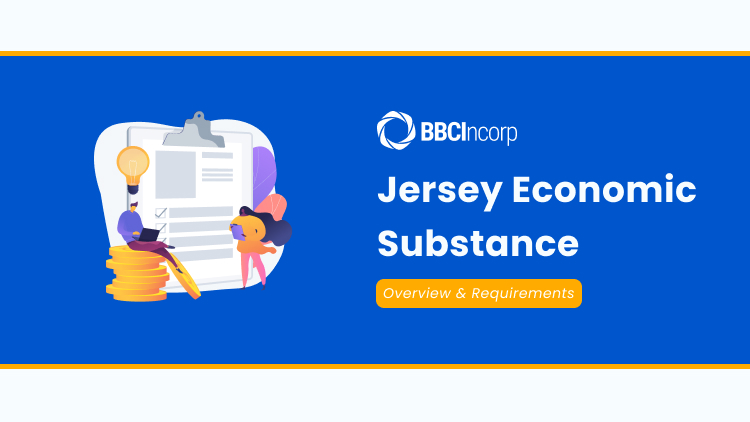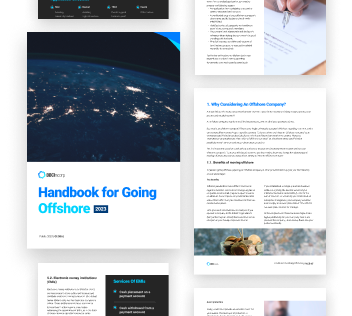
Table of Contents
Jersey Economic Substance – a brief intro
In a 2017 review, the EU’s Code of Conduct Group identified a concern regarding Jersey’s absence of statutory substance regulations. This concern stemmed from the possibility that profits generated by companies resident in Jersey might not accurately reflect their economic activities within the jurisdiction.
To address this issue, Jersey Jersey implemented the Taxation (Companies – Economic Substance) (Jersey) Law 2019, also known as the ES Law. This law requires specific companies to demonstrate that they possess sufficient “economic substance” within Jersey. The ES Law applies to financial periods beginning on or after January 1, 2019.
Economic Substance requirements in Jersey
The Economic Substance requirements in Jersey apply to companies that are tax resident in Jersey and engaged in certain types of activities known as “relevant activities.”
A company is considered a tax resident in Jersey if it meets all the following criteria:
- Centrally managed and controlled: The company must be centrally managed and controlled in Jersey. This means that the strategic decisions and overall management of the company must take place within Jersey.
- Tax rate: The company is subject to tax in Jersey at a rate of 10% or higher on any part of its income. In other words, it must be liable to pay corporate income tax in Jersey.
If your company falls within the Economic Substance cases, it is classified as a “relevant company”, and you must meet the following 3 key tests to demonstrate your compliance.
1st test: Directed and managed inside of Jersey
To comply with the ES Law, your company must be directed and managed inside the borders of Jersey. This means:
- Board of directors meetings should occur in Jersey at suitable intervals.
- A minimum number of directors must physically attend these meetings, especially when they are deemed crucial to the company’s operations.
- Meeting minutes must be recorded during these board meetings, documenting the strategic decisions made by the company.
- All meeting minutes must be stored within Jersey.
While it’s not mandatory for all meetings to be held exclusively in Jersey, it is expected that a majority of the board meetings will be conducted on the island, with a sufficient number of directors present to form a quorum.
2nd test: Demonstrate adequate activity in Jersey
In this second test, relevant companies have to demonstrate adequate activities in Jersey. The activities are listed above:
- Workforce: The company must maintain a sufficient number of employees physically present on the island.
- Expenditure: The company must exhibit an adequate level of financial expenditure in Jersey.
- Assets: The company must possess access to appropriate physical assets or premises within Jersey.
Important note: the term ’employees’ is not limited to those formally employed by the company; it also encompasses individuals recognized as employees under Jersey Law, such as owner-managers or directors. Additionally, any outsourced service providers operating within Jersey will be considered as part of this evaluation.
3rd test: Conduct core income generator activities (CIGAs) in Jersey
The final test evaluates whether the company carries out Core Income Generator Activities (CIGAs) within the jurisdiction of Jersey. These CIGAs encompass:
Banking business
- Raising funds, managing risk including credit, currency, and interest risk
- Taking hedging positions
- Providing loans, credit, or other financial services to customers
- Managing capital and preparing reports and returns
Insurance business
- Predicting and calculating risk
- Insuring or re-insuring against risk and providing insurance business services to clients
Fund management business
- Taking decisions on the holding and selling of investments
- Calculating risk and reserves
- Taking decisions on currency or interest fluctuations and hedging positions
- Preparing reports and returns
Financing and leasing business
- Agreeing to fund terms
- Identifying and acquiring assets to be leased (in the case of leasing)
- Setting the terms and duration of any financing or leasing
- Monitoring and revising any agreements
- Managing any risks
Headquarters business
- Taking relevant management decisions
- Incurring expenditures on behalf of group entities
- Co-ordinating group activities
Shipping business
- Managing crew (including hiring, paying, and overseeing crew members)
- Overhauling and maintaining ships
- Overseeing and tracking deliveries
- Determining what goods to order and when to deliver them, organizing and overseeing voyages
Holding company business
- Solely holding and managing equity interests (e.g., shares) in other entities, such as subsidiaries or group companies
Intellectual property holding business
- Making strategic decisions and managing the primary risks associated with developing and profiting from intangible assets that generate income.
- Making strategic decisions and managing the primary risks related to third-party acquisition, subsequent exploitation, and protection of intangible assets.
- Conducting the core trading activities that enable the utilization of intangible assets, ultimately leading to revenue generation from third parties.
- Engaging in research and development activities focused on patents and similar assets.
- Handling marketing, branding, and distribution efforts for intangible assets such as trademarks, brands, and similar properties.
Distribution and service center business
- Transporting and storing goods, components, and materials
- Stock management
- Orders taking
- Consulting or other administrative services
For the details of each sector, please visit the following Guidance on Jersey Economic Substance.
Reporting obligations for Economic Substance
Companies subject to the Economic Substance regulations must provide certain information to the Comptroller to demonstrate compliance with the economic substance tests.
This information must be filed along with company’s annual tax return, including:
- Business type and income type to identify the nature of the Core Income Generating Activities (CIGAs) performed
- Confirmation of whether each CIGA was carried out or not
- Gross income, typically derived from the turnover figure in the financial statements, for each CIGA performed
- Detailed breakdown of operating expenditures for each CIGA
- Business address or premises details in Jersey
- List of qualified employees
- A financial statement
- Confirmation of whether CIGAs were outsourced, if applicable, along with the relevant details.
- Net book value of the company’s tangible assets.
Free ebook
New to offshore business landscapes?
All the essential information you need is right here.

Penalties for non-compliant company
The Comptroller has a responsibility to assess whether your company has met or failed the Economic Substance tests for a given financial period.
If your company does not meet the requirements, the Comptroller is obliged to issue a formal notice to your company, which includes:
- The decision regarding the penalty
- The reasons behind this decision
- The potential penalty amount, which could reach up to $121,000.
- Recommendations for actions your company should consider taking to align with the substance tests.
If a company fails the substance test for two consecutive years, the Comptroller has the authority to not only impose fines but also implement measures that could ultimately lead to the company’s closure.
Conclusion
Companies in Jersey that are subjected to substance tests should start preparing their required information early to avoid the penalty as per the law.
Should you have any concerns or queries about this matter, our experts are always available to assist. Drop us your questions at service@bbbcincorp.com or visit our Jersey Company Formation to gain more useful information.
Disclaimer: While BBCIncorp strives to make the information on this website as timely and accurate as possible, the information itself is for reference purposes only. You should not substitute the information provided in this article for competent legal advice. Feel free to contact BBCIncorp’s customer services for advice on your specific cases.
Industry News & Insights
Get helpful tips and info from our newsletter!
Stay in the know and be empowered with our strategic how-tos, resources, and guidelines.





